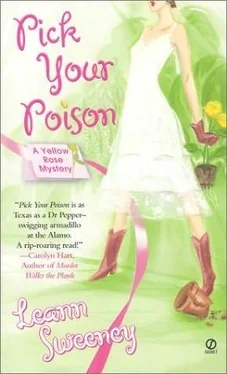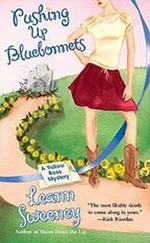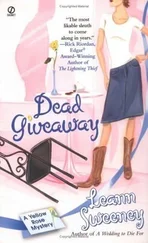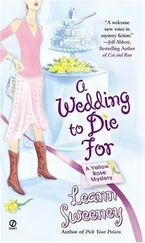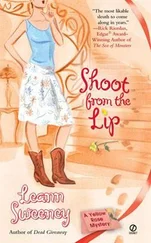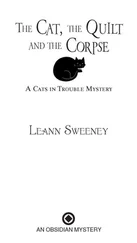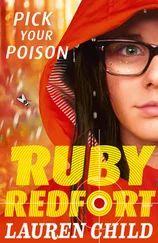Leann Sweeney
Pick Your Poison
For Candy, my sister, best friend,
and ally against the odds.
The sun could have melted diamonds that day, and I spent the afternoon poolside, wasting away in Liptonville for the thirtieth time in a month. I’d just come out of the water and was slopping on more sunscreen when I noticed Ben hovering by the gate to the pool.
Ben never hovers. As the hardest-working yardman in the kingdom of River Oaks—the overindulged and overendowed section of Houston—he stays far too busy to hover. His daily challenge is to keep the property that my twin sister and I own from turning into something reminiscent of a tropical rain forest.
He held a rake, and wore his regular white cotton shirt and gray khaki work pants. A wide-brimmed canvas hat shaded his face.
“You need something, Ben?” I asked.
“If you’ve got a moment, Miss Abby.”
“A moment? I stay about as busy as a ghost-town undertaker, so I can offer you endless moments. Come on over here.”
He rested the rake against the wrought-iron fence, dragged a chair from the patio table, and sat next to me. His lined face was tense with concern and he stared down at the pebbled deck. “Will your sister be home at the regular time?”
I set down my bottle of SPF 45. “I think so. Is something wrong?”
“Not wrong, exactly. Sorry... yes, maybe wrong—but nothing that’s your fault, or Miss Kate’s fault.”
He took off his hat and wiped a forearm across his sweat-beaded forehead. “Didn’t think this would be so hard.”
“You’re not quitting, are you? Because if you need more money or—”
“I don’t need your money, miss.”
“Okay. So what is it? You seem upset.”
“You and Miss Kate... well, I know you’ve been grieving. Trying to get over losing your daddy so sudden and all. I’ve been waiting for the right time to say what needs saying.”
I’d never seen him so nervous. “I’m listening, Ben.”
He hesitated. “See, that’s why I was asking about Miss Kate. I don’t think I can say this more than once, and you both need to hear. I was hoping I could come up to the house when she gets home from the university.”
“Sure, but—”
“About six o’clock, then. Got work to do, miss. Lawn by the front drive needs edging.” And with that, he practically ran back to his rake and retreated across the yard.
“Wait!” I called. “Can’t you give me a hint what this is all about?” Secrets—and this sure sounded secret—are something you tell only one person at a time, and he needed to tell me first .
But he was hurrying toward the shed where we keep the lawn mowers, and if he heard me, it was ignored.
He’d left the gate ajar, and Webster, Kate’s Border collie, took this as an invitation to join me. Since he couldn’t fit beneath my low-to-the-ground chaise, he sought shade under the chair Ben had abandoned. After stretching out, I reached over to scratch his head.
“What do you think that was all about, Webster?” I said.
But he ignored me too, and soon I dozed off, still wondering what quiet, unobtrusive Ben might find too difficult to say more than once.
* * *
I’m not sure how much time passed, but the monstrous brick house Daddy willed to Kate and me was beginning to cast its shadow over the pool when Webster started all the commotion. At first I was grateful his barking woke me, because I’d slipped into this mini nightmare where I found myself at the altar dressed in white tulle and red cowboy boots, prepared to remarry my ex-husband. Seems I’d spent so much time on the deck this summer, I’d sizzled my brain cells along with the rest of me.
I slipped into the tepid water and swam a few laps, hoping to rid myself of the dream, but now that Steven had presented himself, the memories wouldn’t leave me alone. When he was sober, the man could charm the gloss off a photograph, and he’d been sober for months, a fact he wasn’t letting me forget.
But if I went soft on him, I’d be watching him hug another commode or be bailing him out of jail on a drunk-and-disorderly charge again. I could resist. I could be strong. Besides, I missed Daddy, not Steven. The “Ex Man” just happened to show up in a stupid dream.
Meanwhile, Webster hadn’t let up with the barking. I returned to my chair and flopped onto my belly, palms pressed against my ears. But I couldn’t drown him out, and since thinking about divorces and drunken encounters had primed my stinger, poor Webster was about to experience the full brunt of my irritation.
I raised up and shouted, “Don’t you know it’s hot enough to boil mercury, animal?” This had no impact, so I flipped over and sat on the edge of the chair. “You’re gonna collapse in an overheated heap, you keep that up!”
He yapped louder.
Now, Webster’s vocabulary is limited to about twenty words, most of them related to food and bodily functions. No surprise the word overheated didn’t register. He kept on barking, transforming my aggravation into a full-fledged death wish.
I stood, took a generous gulp of watered-down tea from my ever-present thermos, and marched on him like Sherman through Atlanta.
The dog’s frenzy, I soon discovered, was focused on the greenhouse door, but where he’d found the energy to pull off this canine rendition of a nervous breakdown I’ll never know. See, Webster manages to squeeze in his twenty-three-and-a-half hours of sleep per day, come hell or high water. He is not your garden-variety Border collie. More like a basset hound in disguise.
When I reached the greenhouse, a little Plexiglas building beyond the rose garden and fig trees on the east side of the property, I stood menacingly above the dog, hoping body language would have a silencing effect. This seemed to work, because he did shut up.
“Guess you wore yourself out,” I said, sounding smug.
Webster fixed his worried brown eyes on my face and sat down with a whimper.
Hmm. Maybe smug wasn’t the appropriate emotion. Maybe I should be worried, too.
Nah. Probably just an armadillo or a possum. Either that, or a water moccasin slithered in there from the nearby bayou.
I reached over the dog for the door handle, ready to chase away whatever creature had him all riled up, but before I could say woof , Webster scampered between my legs like I was up on jacks in the garage and raced toward the house.
“What’s got into you?” I mumbled, pushing my sunglasses to the top of my head. I pressed my nose against the screen to peer inside.
What I saw made me yank open that door, but then I clung to the frame, paralyzed by the scene before me.
Ben lay spread-eagled on the dirt floor between gallon pails of antique roses, and one look at his face told me I couldn’t help him. His eyes were wide, his lips were blue, and his face was scarlet.
The tea I’d drunk threatened to erupt, but I swallowed hard and forced myself to take those few short steps to kneel beside him. A plastic watering can had tipped over—probably dropped it when he collapsed—and his right hand rested in a wide, wet circle. I checked his neck for a pulse, and though his skin felt warm, he was definitely dead.
I gripped his shoulder, my head bent. “Oh, my God, Ben, I am so sorry. So very sorry.”
The small building seemed to close in on me then, the smell of roses, pine-bark mulch, and lemon thyme all mixing together with another odor, something familiar but one I couldn’t identify.
I grasped the edge of the nearby potting table for support, then stumbled outside. The flimsy door shut with a thwack , and I stood for a second, my pulse roaring in my ears.
Читать дальше
